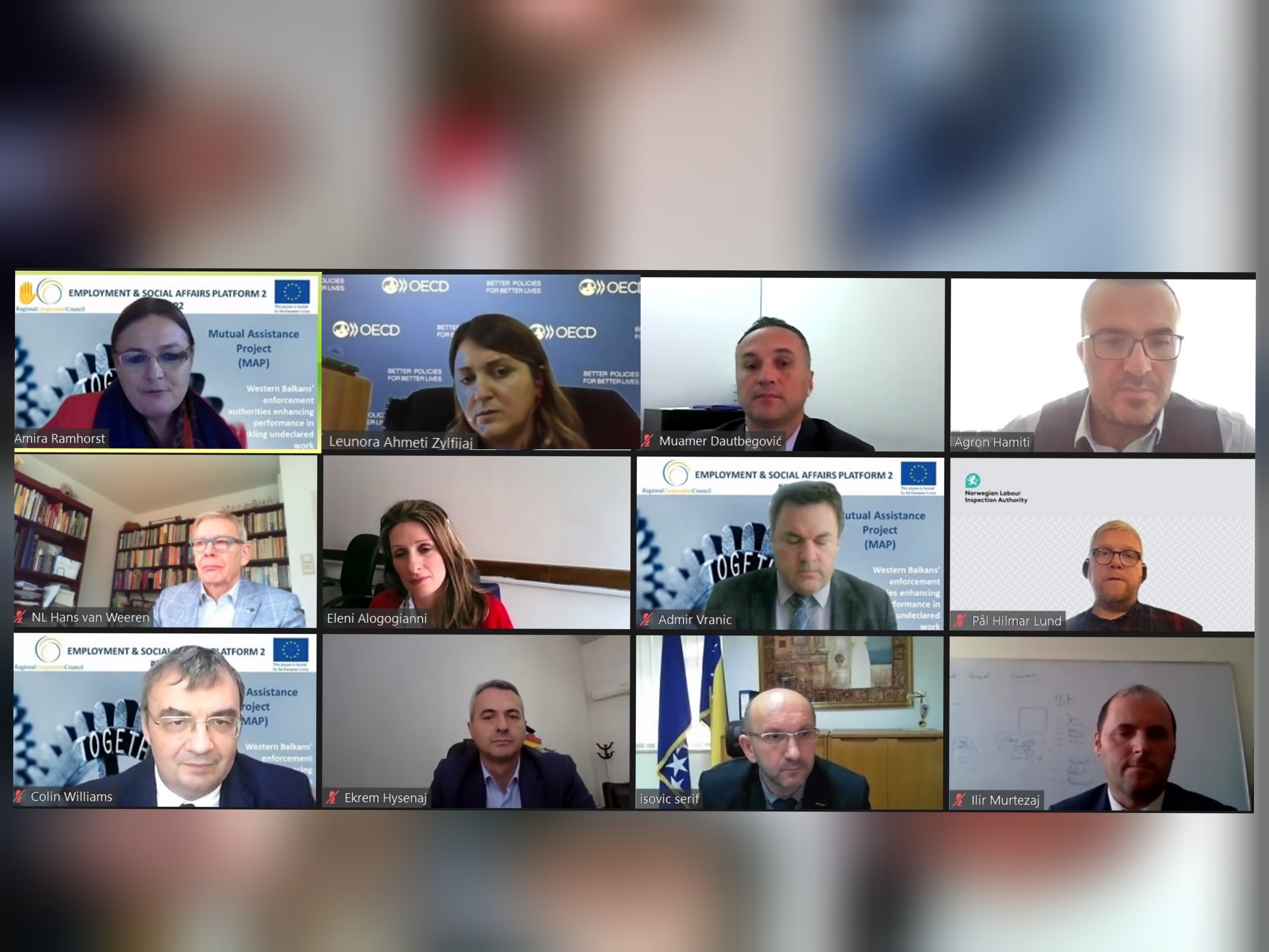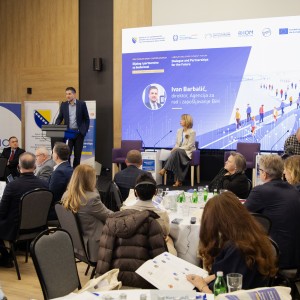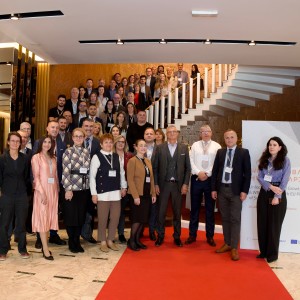News
25 October 2021 |News
RCC ESAP 2: Sharing and Learning among Peers from Western Balkan and European Enforcement Authorities Continue at 4th ESAP 2 Mutual Assistance Project Session in 2021

4th session of the Mutual Assistance Project(s) (MAP) (Photo: RCC ESAP 2)
Enhancing performance of Western Balkan enforcement authorities in tackling undeclared continues through mutual exchange
The 4th session of the Mutual Assistance Project(s) (MAP) for enforcement authorities in the Western Balkans (WB) aimed at enhancing their performance in tackling undeclared work, co-hosted by the Regional Cooperation Council’s (RCC) Employment and Social Affairs Platform (ESAP 2) and the Tax Administration and Labour Inspectorate from Kosovo*, took place today, 25 October 2021, online.
Amira Ramhorst, ESAP 2 Project’s Team Leader welcomed all the participants - the co-hosts from Kosovo*, and peer experts from the Western Balkans and Europe to the 4th session of MAP. Ramhorst extended special thanks to Mr. Ilir Murtezaj and Mr. Serif Isovic, Directors of the Tax Administrations of Kosovo* and of Federation of Bosnia and Herzegovina, Bosnia and Herzegovina respectively, as well as Mrs. Leunora Ahmeti-Zylfijaj, Head of the Division for Labour Relations, Social Dialogue, Safety and Health at Work at the Ministry of Finance, Labour and Transfers of Kosovo* who joined today’s meeting, for their commitment to the project and excellent cooperation of their respective institutions with the ESAP 2 project.
The Directors, Murtezaj and Isovic, expressed their appreciation of the MAP exercise as it helped their institutions in enhancing their activities focused on tackling undeclared work that represents a challenge for both economies, and the region as a whole. They also highly appreciated opportunities to learn and eventually apply some of the methods and activities that have proven efficient in tackling undeclared work and transforming it into declared work elsewhere.
The topics discussed included the strategic objectives of the Tax Administration(s) and Labour Inspectorates(s) and joining-up strategy across government; coordination among enforcement authorities but also cooperation with social partners; collection, exchange and analysis of data; practical approaches to enforcement using penalties and increasing the probability of detection; supply- and demand-side incentives; and finally education and awareness raising on benefits of declared work, and building trust in the enforcement authorities.
The peer experts from the Western Balkan region and European countries during this MAP session included representatives from Tax Administration of Federation of Bosnia and Herzegovina, Bosnia and Herzegovina, and Labor Inspectorates’ representatives from Greece, Netherlands and Norway, who shared their best practices that proved to be highly effective in tackling undeclared work in their respective institutions and could be adjusted and potentially replicated in the institutions of MAP co-host.
“The aim of MAP is to improve the capacity of Western Balkan economies to deal with undeclared work and drive change to promote better working conditions and the emergence of declared work. MAPs are just one of the available tools to strengthen enforcement authorities in tackling undeclared work, while others like seminars, workshops, staff exchanges, development of toolkits, studies also play important roles as learning tools”, said Colin Williams, ESAP 2 Lead Expert on undeclared work, explaining the importance of learning process in times of change. He added that the focus for the future could be put on measures that incentivize and persuade employers to transform undeclared work into declared work.
The MAP co-hosts from Kosovo* enforcement authorities shared their practices and experiences across the board with other peer experts, soliciting their experiences and good practices as applicable, especially looking for opportunities for enhancement and best practices . Open and technical discussion led to a range of possible practices that can be adopted to enhance performance, many of which relate to enhanced coordination with other institutions and sharing of data and knowledge.
This MAP session, like the previous ones, ended with a series of suggestions on how to enhance performance in tackling undeclared work that will be shared with all meeting participants for further consideration and potential application in practice.
The ESAP 2 Mutual Assistance Project (MAP) offers a Western Balkan enforcement authority the opportunity to be counselled in an area where they need critical support and/or possible improvement. These mutual assistance projects are practical, hands-on, and tailored learning activities designed to support and transfer practices, to help solve issues, provide advice, and provide implementation support.
Please find dates for the next MAP sessions on the ESAP 2 web calendar of events.





